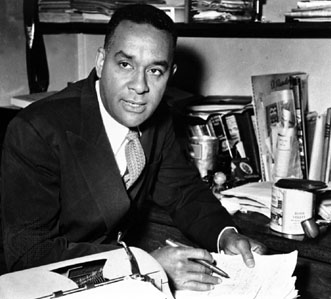Great American writer, Richard Wright, was best known for his novels Black Boy and Native Son. Wright was born on September 4, 1908 in Natchez, Mississippi. He was the grandson of slaves, and the son of a sharecropper. His father left the family when Wright was only five years old, leaving him in the sole care of his mother.
Life was difficult for Wright as a young black man growing up in the deep South. He went to school in Jackson, Mississippi and despite being an avid reader, poverty forced Wright to drop out after ninth grade. He worked a multitude of odd jobs to earn an income and used his free time to read; he even forged a note so that he was able to obtain a library card. When Wright was sixteen years old, his first short story was published in an African American newspaper.
In 1927, Wright left the South and its Jim Crow laws behind. He moved to Chicago where he worked at a post office, but spent the majority of his free time reading and writing. In 1937, he joined the Federal Writer’s Project and moved to New York City with dreams of making a living as a writer.
Less than a year after his move to New York City, Wright’s gamble paid off. His first book was published, Uncle Tom’s Children, which was a collection of short stories. The stories earned him a Guggenheim Fellowship and a $500 prize from Story magazine.
His 1940 publication of Native Son was successful enough for Wright to become a full-time writer. Native Son was the first book by an African American to be selected by the Book-of-the-Month-Club. In 1945, his semi-autobiographical work, Black Boy, was published. Despite his success in America, Wright decided to move to Paris as an expatriate; he no longer wanted to live among the failings of “white America.”
Wright's work, particularly Native Son, was an important depiction of 20th century racism and its consequences. His writing showed more than the injustice inherent to the time, but the grave problems "the system" was creating between the oppressors and the oppressed. Those who were oppressed were not noble victims, but rather people--and racism created systems where neither side could see the other as human beings with wants, desires, and faults of their own. Native Son’s protagonist, Bigger Thomas, faces this very problem. He wants a better life, but cannot accept the help of “radicals” who wish to challenge the system because he cannot understand them just as they do not understand him.
Wright lived in Paris until the end of his life, publishing other work including The Outsider, The Long Dream, and nonfiction pieces such as Black Power and White Man, Listen. In November of 1960, Wright passed away from a heart attack at his home.











